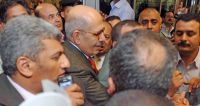The return of Mohamed ElBaradei from abroad is rattling Egypt’s rulers

However, the parties agree that it aims to undermine Egypt’s stability and that its spearhead is none other than Mohamed ElBaradei, winner of the Nobel peace prize and the recently retired head of the International Atomic Energy Agency, the UN’s nuclear watchdog.
The revelation of such a plot surprises few in Egypt. Ever since November, when Mr ElBaradei declared that, if rules were made fair, he might just consider running for president in 2011, expectations have grown that allies of Egypt’s current ruler, Hosni Mubarak, would find ways to attack this upstart rival. When Mr ElBaradei arrived in Cairo last month for a ten-day visit, such expectations soared. Not only did the thousand cheering fans who mobbed him at the airport outnumber the active membership of the seven government-sponsored opposition parties now aligned against him. The soft-spoken former diplomat became the talk of Egypt’s chattering classes, as scores of prominent intellectuals declared their backing for him, and membership of a Facebook support group rocketed to 160,000.
The reasons for the surge in his popularity are evident. “After 40 years of being kept out of politics, Egyptians need a catalyst, a person to tie their hopes to, and to link them to an idea for change,” says Abdul Rahman Yusuf, a popular poet who, without even asking Mr ElBaradei, founded a campaign to promote his candidacy that has attracted thousands of volunteers.
Despite his mild manner and liberal ideas that contrast with the steamy nationalism and religious conservatism that have characterised Egypt’s political discourse, Mr ElBaradei appears to have touched a deep chord, especially among the young, by insisting that Egypt’s many social ills result not so much from policy failures as from an absence of democracy.
Nice timing?
Luckily for Mr ElBaradei much of Egypt’s public is tired not only of the party that has ruled them without interruption for decades but with the highly restricted game of politics it has created. This includes a co-opted loyal opposition as well as the officially outlawed Muslim Brotherhood, which has long served as a bogeyman to frighten doubters, including Western donors, into grudging support for the ageing president and his government.
Mr ElBaradei is also fortunate that one of the few chinks in the armour of Mr Mubarak’s state is a relatively free press. Despite a flood of innuendo and calumny from regime mouthpieces, independent newspapers and television channels have given the newcomer a fair hearing.
He may also benefit from having spent most of the past 30 years abroad. “His file is small—they have nothing on him,” says Mr Yusuf. “When they attack a person of his international stature, it looks bad abroad, and that scares them.”
Yet even supporters admit that Mr ElBaradei’s long absence from Egypt could prove one of many handicaps. The rules for presidential candidates make it hard, if not impossible, for independents to run. Mr ElBaradei refuses to join one of the dozen parties licensed by the government to play politics, insisting instead on changes to the constitution to open the field to all comers and to ensure a fair vote. This, say some, is unrealistic.
Mr Yusuf, however, points out that the government itself has added some 35 new clauses to the constitution in the past five years. He and other supporters of Mr ElBaradei, including a range of groups that have long pressed for political reform, are launching a petition demanding seven changes, among them a scrapping of Egypt’s notorious emergency laws, provisions for independent monitoring of the polls and use of national identity cards for voting, rather than a cumbersome and restrictive system of voter registration. They are confident they will get millions of signatures. But they are less sure that even if they do, the government will listen.